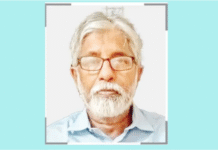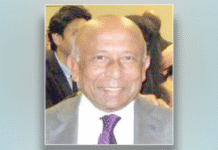The prosecution on Tuesday filed a petition with the International Crimes Tribunal-1 seeking to issue a contempt notice upon the Human Rights Watch (HRW) for publishing a ‘contemptuous’ report over its judgment on former Jamaat-e-Islami ameer Ghulam Azam.
The petition, signed by designated prosecutor Sultan Mahmud Simon on behalf of the Chief Prosecutor, was officially submitted to the ICT registrar during the court hour.
The petitioner accused the HRW, a New York-based global rights watchdog, its Executive Director, Asia Division, Brad Adams, and Associate, Asia Division, Storm Tiv of violating section 11 (4) of the International Crimes (Tribunals) Act 1973.
Talking to UNB over cellphone this afternoon, prosecutor Simon said, “We’re expecting that the matter will come up on the cause list tomorrow (Wednesday) and there’ll be an appropriate order from the tribunal in this regard.”
On July 15, the ICT-1 sentenced Ghulam Azam to 90 years’ imprisonment finding him guilty of all five charges of the 1971 crimes against humanity and genocide against him.
Ghulam Azam has appealed against the verdict before the Appellate Division of the Supreme Court while the prosecution appealed against inadequate sentencing of the former Jamaat chief.
After a month of pronouncement of the judgment, the HRW on August 16 published a report on its website headlined ‘Bangladesh: Azam conviction based on flawed proceedings: Analysis outlines how fair trial rights of accused seriously compromised’, claimed that the trial of the former Jamaat-e-Islami chief was deeply flawed and it had not met the international standards.
It said the “Judges improperly conducted an investigation on behalf of the prosecution” and expressed concern over “collusion and bias among prosecutors and judges.”
The HRW also expressed concern over the “failure to take steps to protect defence witnesses”, and “lack of evidence to establish guilt beyond reasonable doubt.”
It also claimed that the defence counsels were not aware of the “investigation” and were thus unable to comment on or challenge the evidence which was a serious violation of article-14 of the International Covenant on Civil and Political Rights to which Bangladesh was a party.
The petitioner termed the HRW report bias, baseless, fabricated and of mala fide intention most unethically commented while the appeals are pending before the Appellate Division.
The petitioner also said the report was not made in good faith and undermined the ICT and its process of exercising its independent judicial functions and also fair trial.
The petitioner further said the HRW by publishing the report through its website and thereby scandalising the tribunal either have ‘tended’ to bring the tribunal into hatred or contempt and or have ‘done’ an act which constitutes contempt of court.
Besides, the petitioner urged the tribunal to stay further display, publication, circulation or use in any manner on in any other form of the ‘scandalous article’.
The petitioner sought for issuing a contempt notice asking the HRW and others as to why contempt proceedings should not be drawn against them in exercise of power of this tribunal under section 11 (4) of the ICT Act 1973 read with its prescribed rule 45, which is almost identical.
Section 11 (4) of the ICT Act reads: “A tribunal may punish any person, who obstructs or abuses its process or disobeys any of its orders or directions , or does anything which tends to prejudice the case of a party before it or tends to bring it or any of its members into hatred or contempt, or does anything which constitute contempt of the tribunal, with simple
Source: UNBConnect










